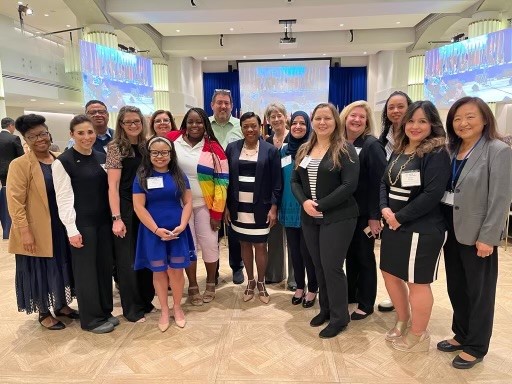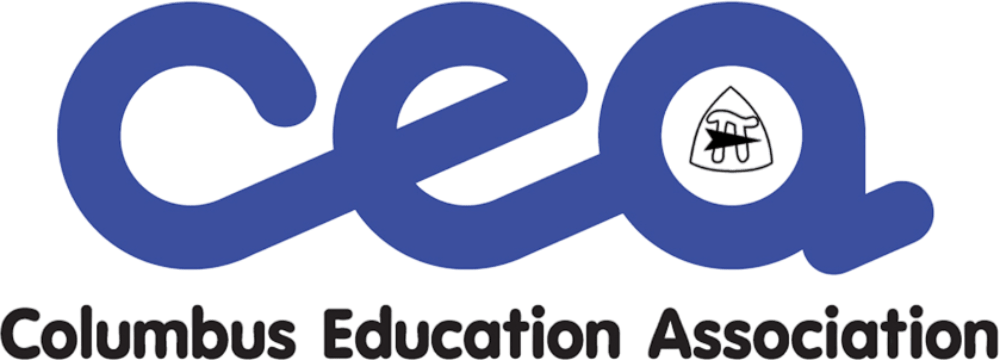 CEA member Lindsay Rice, a third grade teacher at Ohio Avenue Elementary School, recently had the opportunity to attend the International Summit for the Teaching Profession (ISTP) in Washington D.C. The 13th annual ISTP brought together 22 countries to discuss how to strengthen the teaching profession and ensure all students have access to a quality education.
CEA member Lindsay Rice, a third grade teacher at Ohio Avenue Elementary School, recently had the opportunity to attend the International Summit for the Teaching Profession (ISTP) in Washington D.C. The 13th annual ISTP brought together 22 countries to discuss how to strengthen the teaching profession and ensure all students have access to a quality education.
Co-hosted by Education International, the U.S. Department of Education and EI members the National Education Association and the American Federation of Teachers, and the Organization for Economic Co-operation and Development, the Summit was organized around the theme “Poised for the Future: Transformative Teaching for Global Engagement, Sustainability, and Digital Access.”
Lindsay has shared her thoughts on attending the conference in an essay she has titled: “Education is the Key and Educators are the Key Makers” – Reflections on the ISTP Summit:
There were so many inspiring things said at the International Summit on the Teaching profession, however, the one that really resonated with me was the quote from the Australian delegation, “Education is the key and educators are the key makers” It reminded me of a research article I had recently read, “The Silenced Dialogue: Power and Pedagogy of Educating Other People’s Children”, by Lisa Delpit. In her article, she talks about the code and the power of teaching the code explicitly. In her article she refers to the code as being that of privilege and there’s many reasons why one does not gain access to that elite code: race, ethnicity, neurodivergence and a host of other reasons. I argue that the code she describes is just a notch on the key to success. In order to create scholars that can access the world, we as key makers must explicitly teach cultural competence, inclusive thinking, multiliteracy, and the ability to look at and solve problems critically. Not only do our individual scholar’s success depend on being able to gain access to the world stage, our democracy depends on it. In order to foster democracy, not just here at home, we must educate our scholars in the ability to weed out fact from fiction, during our endless fight to end misinformation and intentional dismantling of our democracy. Our scholars must be able to speak with others to continue peace within our world. The cultural and neurological benefits of multiliteracy must come to the forefront as we leave behind the idea that English is the only academic language.
At the start of the summit I was nervous being surrounded by brilliant people from across not only this country, but the world. I quickly learned that our physical distance may be vast, but our commonalities are as well. The leadership and members of the NEA were extremely inclusive and welcomed me right in. The amount of talent and drive I was surrounded by was inspiring. I found myself using the leadership skills I obtained in the Teacher Leadership Institute to listen, connect and move myself to action. I especially felt moved to be a changemaker when listening to NEA president, Becky Pringle, speak on the importance of community schools. The child may be the one physically in the building, however, they carry the community with them wherever they go. The more struggles the community has, the heavier the load is. Our scholars in poverty and/or marginalized populations face not only the trauma that occurs, in addition the added trauma of low expectations. Our scholars are brilliant and abundantly capable of learning. We must first remove the perceived barriers that often cause low expectations. We must guide our scholars to believe they are capable of success in a system that often portrays them as the underdog, or worse, the villain. Time after time and year after year, I have experienced that when children see themselves as scholars, the families see themselves as partners and the community comes together, student achievement is bolstered.
Sometimes in the four walls of our classroom it becomes hard to think about what is going on down the hall let alone what is happening in the world. I had the amazing opportunity to visit Escuela Key Elementary where they are molding globally biliterate scholars. As I walked into the building to children singing beautifully in Spanish, I realized that in front of me were citizens of the world, they were an integrated group of beautiful children learning how to work together in two different languages.
There is often a disconnect between the needs of the vastly different school districts in our country creating an “us against them” mentality; when the global education of the world’s children is in everyone’s best interest. Canada’s delegates mentioned their initiative to create virtual classes to keep opportunities equitable between all schools regardless of rural or urban, poverty or high socioeconomics and to even the playing field of access to different experts. This innovative idea may cause us to question the future of our roles as educators in addition to the role of the physical classroom. I believe this offers an opportunity for us to have an even greater impact on our students. I often hear education professors talk about when their future teachers go to content classes outside of the education department. They explain that content professors often lack the ability to teach future educators in a deliberate and appropriate way as they are used to in their education courses. If we as educators perfect our craft of teaching students, and how to engage them in inquiry, building and fostering relationships with them, then those virtual classes will allow us to facilitate and learn with our scholars. It will allow them to not only learn the content but experience a shared learning experience, with us as the model of how to learn. What an amazing opportunity for our scholars.
I could go on forever due to the vast amount of insight that was offered these past couple of days. As many politicians in America try to figure out how to strategically defund public education, in the idea that it is not the public’s job to educate others children. Their selfish theory is flawed because an educated world is a safer world. A connected world is a safer world. It is harder to have extreme feelings about a group of people when you see them as individuals. It’s harder to be an isolationist when you realize your commonalities and connections to the world. The Global Market will continue to grow and thrive. Our children’s success in that market will be determined by the type of key that is forged for them. Content is important, however, the greatest key we can give our children is the ability to communicate, collaborate and engage in inquiry with the world around them.
